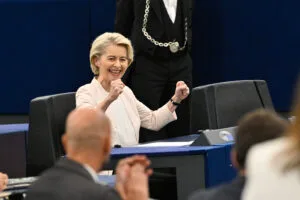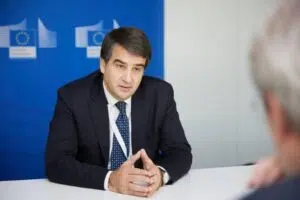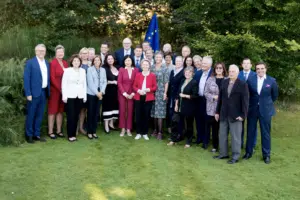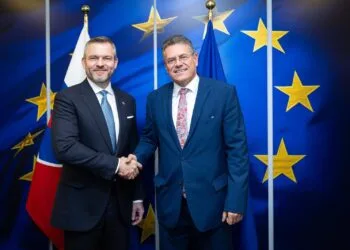Brussels – The commissioner candidates race in the new College that, starting at the end of the year, will be led again by Ursula von der Leyen kicked off. With just a few weeks to go from the start of individual interviews between the president-elect and the potential members of the second von der Leyen Commission, papers from nine member countries are already on the table: two are certain (Germany and Estonia), and seven others that will have to pass through the scrutiny of the President of the EU executive and, together with the entire College of Commissioners, of the 720 MEPs before the official inauguration.

In addition to Germany, which will express the presidency of the Commission with Ursula von der Leyen, and Estonia, which will see former prime minister Kaja Kallas become EU High Representative for Foreign Affairs and Security Policy – both nominations are the responsibility of the European Council, which decided at the June 27 EU leaders’ summit — since the weeks following the European elections in early June to today official nominations came from the governments of Slovakia, Latvia, Slovenia, Ireland, Sweden, Finland, and Netherlands. At the moment, however, none of the proposals of the seven governments (Germany and Estonia being the exceptions) meet the request President von der Leyen made to the EU Parliament within minutes of her confirmation on Thursday (July 18), the same as in 2019: “In the coming weeks I will ask the member states to propose the commissioner candidates, one man and one woman,” before individual interviews “in mid-August.” The other standard for the new College, however, cannot be waived: “I want to choose the best who share the European commitment, and in terms of numbers, there will be parity between men and women,” von der Leyen made clear.
As for the names that have come in so far, Slovakia has proposed again the outgoing executive vice president of the EU Commission responsible for Interinstitutional Relations and the Green Deal, Maroš Šefčovič, who could thus serve his fourth consecutive term. Latvia proposed for the third time in a row the outgoing executive vice-president from the EU Commission responsible for the Economy, Valdis Dombrovskis. On the other hand, Slovenia proposed a new name, lawyer and economist Tomaž Vesel, former president of the National Audit Court and FIFA’s Audit and Compliance Committee. For Ireland, there is the center-right Fianna Fáil and former minister for Public Expenditure and Reform (2020-2022) and Finance (2022-2024), Michael McGrath. The government of Sweden decided to bet on the minister for European Affairs, Jessika Roswall. Finland proposed the MEP in the ranks of the European People’s Party since 2014, Henna Virkkunen. Last in chronological order is the nomination by the new right-wing government of the Netherlands of the outgoing European Commissioner for Climate Action, Wopke Hoekstra, nominated yesterday (July 23) for a new role in the second von der Leyen cabinet.

The right-wing government of Italy chaired by Giorgia Meloni has not announced the official candidate yet, nor has it made it known when it will make it known. However, in an exclusive interview with Eunews, Forza Italia’s head delegation to the EU Parliament, Fulvio Martusciello, said: “The commissioner should be Minister Raffaele Fitto. We have already debated it extensively, and it will be him.” Fitto is currently the minister for European Affairs, Cohesion Policies, and the NRRP from Fratelli d’Italia, the major partner in the governing coalition with Forza Italia and the League that took office on Oct. 22, 2022. He held the office of MEP between 1999 and 2000 and between 2014 and 2022 (from 2019, he was co-chair of the European Conservatives and Reformists group), was the governor of the Puglia Region between 2000 and 2005, and minister for the Regions and Territorial Cohesion between 2008 and 2011 in the last government led by Silvio Berlusconi.
The nomination and election of commissioner candidates
According to the EU Treaties, European commissioners – one from each member country – are appointed in agreement between the EU Commission presidency and the member states, who recommend them based on “general competence,” “European commitment,” and “guarantees of independence.” The Council of the European Union adopts the list of commissioners who must also pass the European Parliament vote. It is not just a question of the political composition of the government that nominates its candidate but also of the majority underlying the Commission in the European Parliament. In other words, a government unbalanced to the right will not be able to overlook the fact that it will have to cash in on the approval of the center-left as well: this is the case, for example, of the Meloni government, which will have to look for a name that the Democratic Party, which in the new legislature constitutes the largest delegation within the group of the Progressive Alliance of Socialists and Democrats (S&D), can digest.

Putting together the new team of European commissioners means striking a delicate balance with the 26 national governments (minus Germany) to agree on the role and portfolio to be assigned. If von der Leyen can reach a compromise quickly for the Council’s adoption of the list of names proposed to Parliament, it could lead to hearings as early as September and October: Each parliamentary committee will review the candidates with written questions and in public hearings, each based on its area of expertise. Finally, the Conference of Presidents will have to draw up a draft resolution to be voted on by all 720 MEPs (watch for the October 7-10 and 21-24 plenary sessions) when a simple majority of the votes will have to approve the appointment of the entire College of Commissioners. The natural start of the von der Leyen Commission’s five-year term is November 1.
English version by the Translation Service of Withub










